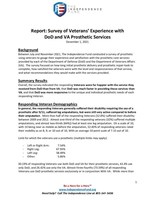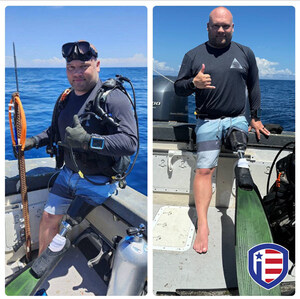WASHINGTON, Dec. 2, 2021 /PRNewswire/ -- Following a six-month time period between July and November 2021, Veterans serving organization, The Independence Fund, conducted a survey among Veterans to gauge their experience and satisfaction levels with the prosthetic care services provided by the Department of Defense (DoD) and the Department of Veterans Affairs (VA).
Focusing on length of initial prosthetic delivery and timeframe for prosthetic repair completion, Veterans were asked to provide their satisfaction levels with responsiveness of the service as well as recommendations they would suggest. The survey found that overall, Veterans were significantly happier with the services they received from the DoD in comparison with the VA. Specifically, the DoD was cited as being more responsive to the unique and individual prosthetic needs of each Veteran.
"These survey results are incredibly important to share," said Sarah Verardo, CEO of the Independence Fund. "Our respondents generally suffered their disability following 9/11, with nearly a third of those requiring multiple amputations. Among those, 64% experienced at least one leg amputation. We know there is no group more able to speak to the Veteran experience than these heroes. We value not just their sacrifice but their insights, as we look for ways to improve the quality of life for them and their Caregivers."
Of note, the survey found that just over 30% of Veterans use prosthetic services from both the DoD and VA. Nearly three-quarters of respondents use DoD prosthetic services exclusively or in conjunction with the VA. Notably, only three DoD prosthetic service facilities exist in comparison with 23 VA service facilities, but Veterans polled are nearly 30% more likely to use DoD prosthetics services than those provided by the VA.
"In speaking with the Veterans we surveyed, we found that over and over again, the DoD is providing a higher level of satisfactory care," said Verardo. "Our results showed Veterans ranked the DoD's prosthetic care almost 31% higher than they do the VA's prosthetics care. The feedback our Veterans gave was invaluable. Many noted that the prosthetics process induces extreme anxiety for them over the trajectory of care they'll receive over their lifetime. Others mentioned lack of staffing and the wait period for appointments. Veterans living with limited mobility need to have repairs made quickly, seamlessly, and reliably, and we know there are breakdowns. These results help us pinpoint where those are and how to address them."
The lack of appointment availability means more than simply an inconvenience to these Veterans who have already given so much. Oftentimes it means aggravating or reopening combat wounds on their residual limbs, which can lead to decreased mobility, income loss, and chronic infection. One respondent offered that in comparison with the VA experience, "the DoD has done an exceptional job at keeping me active, happy, and employable."
"Anecdotally we hear from Veterans we serve that they would rather travel further, sometimes even across the country, to access DoD prosthetics services than to use closer VA ones," says Verardo. "The disparity in these experiences is crucial to understand, and even more vital to close. Following our analysis of these results, The Independence Fund is pleased to present several recommendations to the Department of Veterans Affairs to provide a more equitable and satisfactory experience to the catastrophically wounded Veterans who have bravely served our country."
The data found in The Independence Fund's survey echoes these sentiments. On average, new and replacement or repaired prosthetics were delivered within 28.8 days of a claim with the DoD, while VA took an average of 87 days.
"These results confirm what we've all seen firsthand in the community. The VA prosthetics department has been the biggest point of failure in my husband's medical care at VA. Although I keep all of his care in the VA system, with prosthetics the frustration and red tape is rampant. On more than a dozen occasions I've been asked to bring him to the VA hospital so that they can confirm that his leg is still missing before they'll authorize repair or replacement parts. This is often dictated by a nameless, faceless administrator who has never interacted with my husband. Sadly, this is not unique to my husband's experience. From replacement shower chairs, to new prosthetic parts, catastrophically wounded Veterans have long been made to "prove" that the limbs haven't magically grown back."
BACKGROUND:
The Independence Fund's Mobility Program provides catastrophically disabled Veterans the chance to regain their independence through the use of all-terrain wheelchairs. The Independence Fund has awarded 2,574 all-terrain trackchairs since the program began in 2007. The mobility program is open to Veterans of all eras who have undergone a severe loss of mobility from a service-connected catastrophic injury or illness. To qualify, Veterans must provide documentation from the VA showing a service-connected catastrophic injury or illness that affects their mobility over half of the time.
ABOUT THE INDEPENDENCE FUND:
Established in 2007, The Independence Fund is a national Veterans Service Organization dedicated to meeting the unmet needs of catastrophically wounded Veterans, Caregivers, and their families through a variety of programs. To learn more, visit www.independencefund.org.
Media Contacts:
Ashley Skinner, Communications Manager
[email protected]
(704) 712-5380
SOURCE The Independence Fund

WANT YOUR COMPANY'S NEWS FEATURED ON PRNEWSWIRE.COM?
Newsrooms &
Influencers
Digital Media
Outlets
Journalists
Opted In







Share this article